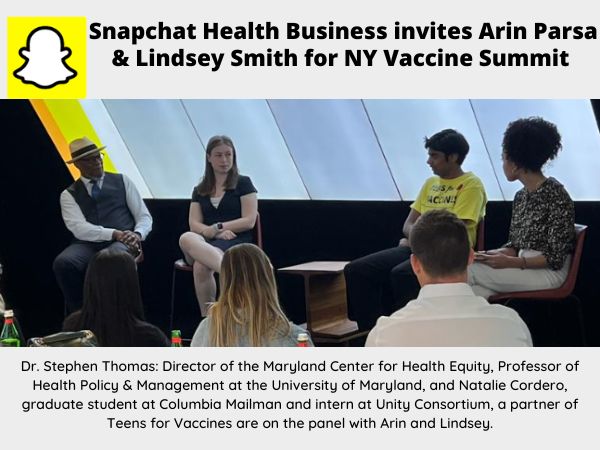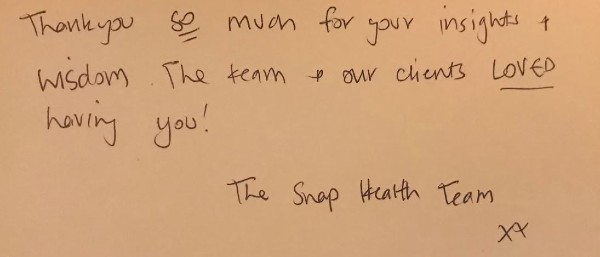


Snapchat Health Business Vaccine Summit
May 16, 2023
Panel Participants:
- Dr. Stephen Thomas: Director of the Maryland Center for Health Equity, Professor of Health Policy & Management at the University of Maryland
- Arin Parsa: Founder of Teens for Vaccines
- Lindsey Smith: Ambassador at Teens for Vaccines, Undergraduate student at University of Michigan
- Natalie Cordero: Graduate student at Columbia Mailman, Communications and Development Intern at Unity Consortium, a partner of Teens for Vaccines
Q & A with Arin Parsa
Tell us a little bit about the mission of Teens for Vaccines and Unity Consortium- how did it start and how has it evolved?
The mission of Teens for Vaccines is to educate teens with the life-saving power of vaccines and empower them to be champions of public health. I founded Teens for Vaccines at the height of the 2019 measles outbreaks, such as the ones in Rockland County in New York, Orange County in California, etc. At the time, disinformation was on the rise on primarily Facebook and Twitter, and many teens were going to Reddit for vaccine information and ways to convince parents. Initially, a big part of our mission was to help them 1-on-1 with resources and be a shoulder to lean on.
When COVID hit, we had to scale our operations tremendously. Also, as more teens were aware of the issue of vaccine hesitancy, peer-to-peer education became so much more important and our network of ambassadors and youth partners scaled up rapidly. Even though our mission was the same, promoting personal stories through social media and news channels became our primary focus.
I’m also a student researcher, so working with legislators to improve school-based healthcare funding, mobile clinics, minor consent laws, and other issues of vaccine inequities affecting racial and gender minorities became very important. Our mission evolved to include legislative activism as a result. Ultimately, our vision is a world where all teens should be aware of the life-saving power of vaccines, must have easy access to vaccines, and have the agency to consent to them.
How important is it to involve young adults in conversations around vaccines vs just talking to parents?
It’s extremely important to involve young adults in conversations about vaccines. Most teens today don’t know their vaccine schedules, the recommended vaccines to get at their age, and other important information. In cases of extreme anti-vax parents or parents that simply don’t have the time, resources, or access to vaccines, teens must be involved in these conversations for them to obtain necessary healthcare for their lives. Vaccines save lives and ensure the immunocompromised are able to live without the threat of deadly diseases, so we must involve young adults in these conversations so they are aware of the importance of vaccines.
We know how important social media is to the Gen Z generation, but we’ve also seen that social media can have negative effects on spreading misinformation when it comes to vaccines. Do you have advice on how to combat that?
The way to combat misinformation is to overcome it with positive and factual information. Education is the best antidote to disinformation. We crack down on noticeably false information since it is damaging for users who want to find information on vaccines. However, to truly combat misinformation and disinformation, the majority that don’t believe in these false claims must speak up and spread correct information. We cannot have our voices be drowned out by a vocal minority that is pushing disinformation that will lead to the propagation of deadly diseases.
What type of information or what medium do you think works best for messaging to the groups you are targeting?
I think social media works best for messaging for the groups we’re trying to target. In fact, I got my start in vaccine advocacy on Reddit, trying to help teens answer questions about vaccines. When the pandemic hit, social media was the main way people were communicating in the absence of real-world interaction. Teens today use social media extremely frequently, with sites such as Twitter, TikTok, Snapchat, and Instagram being the main sites. To reach teens most effectively, I think social media would be the way to reach the most teens at a time in the most efficient manner.
Do you have any advice for our guests today for how to positively impact this generation of health conscious individuals?
I think that in today’s climate of disinformation, it’s important to incorporate teens into conversations about health. We want to know about our own bodies and what we need to do to ensure that we can live happy and healthy lives. We also want to receive literature about health, so we don’t feel excluded from difficult discussions. To break down generational barriers, I think that we need to mend the gap between generations on health-related subjects, which is what I encourage everyone in the audience to do.